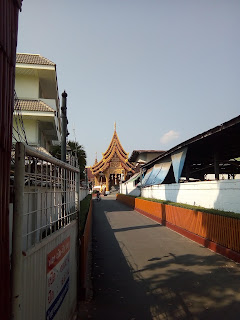What did strike me about Thailand, and this is something I'm more sensitive to after my sojourn in India, is that there is a core dignity to Thai daily life, a steadfastness or integral quality to its people. I suspect (but of course cannot prove) this has everything to do with the fact that the country was never subject to Western European or Japanese colonial domination. It's something subtle but pervasive, the way that ordinary people are not automatically afraid of the police or higher officials, the way Thai tourists interact in an offhand and relaxed way with ordinary street vendors, and the way Thais in general are tolerant of foreign visitors from all over the world (again, this may just be Chiang Mai, so I'm happy to stand corrected by readers better informed than I).
By the way, the majority of tourists who come to Thailand these days are from mainland China, and it was fascinating to see Chinese families walking around town, snapping photos and sampling the local mango and sticky rice (highly recommended, if you've never had it before) just like their European and American counterparts. Believe it or not, the expansion of intra-Asian tourism is extremely important for the geopolitical stability and further development of East Asia and Southeast Asia, regions which are just beginning to overcome the legacies of colonialism and the tensions of the Cold War. Tourism could become one of the main drivers of Asian integration, similar to how it helped Europe overcome its terrible past to create the largest single zone of democracy and prosperity on the planet.
Here's one of Chiang Mai's well-kept public squares:
Buddhism is pervasive in Thai culture, and one sees temples, shrines and monks throughout the city. Here's a temple located in an ordinary urban neighborhood:
This next shot shows one of the intersections just north of the old city, which has been turned into a flower-laden miniature theme park. Note the brick structure on the left, which is a remnant of the fortress wall which once surrounded the old city.
According to the historians, Chiang Mai was founded in 1296 by the Lan Na polity, a regional empire which existed for hundreds of years until a series of wars with neighboring Myanmar forced it to become a vassal state of the Thonburi dynasty in 1776. All that is left of this dynastic history are remnants of the brick walls which once surrounded the four sides of the old city. The walls are visible next to canals with tree-lined sidewalks, former protective moats turned scenic landmarks. The city authorities have turned the moat into an urban walk, replete with potted plants and pedestrian bridges:
One of the highlights of my stay was visiting the Flower Festival, an annual event where horticulturists and flower-sellers gather to showcase their creations. Here's a shot of the public park:
The floats are amazingly creative. Check out this giant monkey comprised of flowers -- the King of all Kongs:
The public park next to the Flower Festival:
Finally, this shot of one of the best little cafes in town:











No comments:
Post a Comment